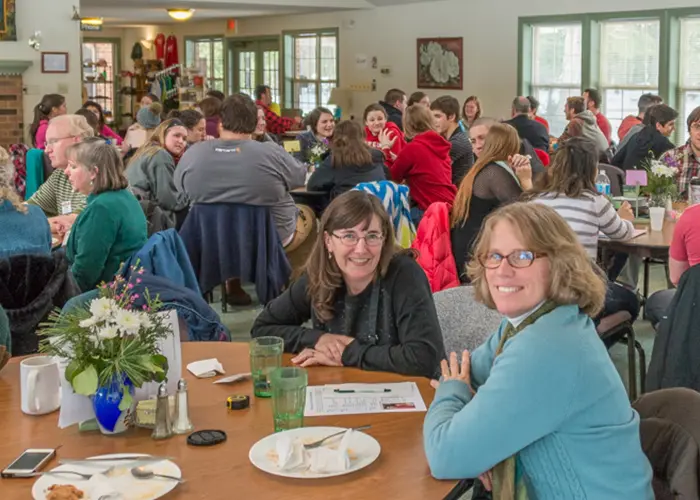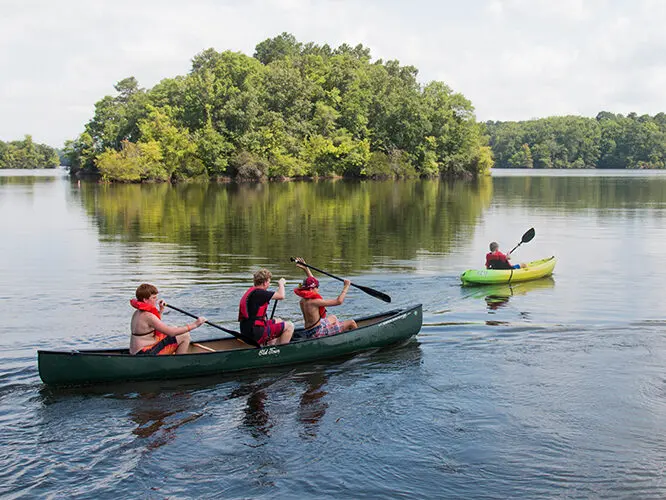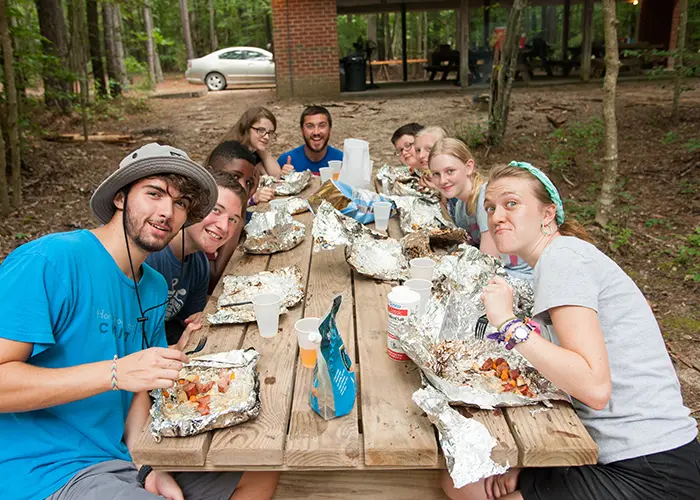
Planning a retreat is an exciting opportunity to create a life-changing experience for your group. Whether you’re organizing a church retreat, youth camp, or leadership getaway, the process can initially feel overwhelming. There are many details to consider if you’re planning a retreat for the first-time, from where to go to what to do and how to make it all come together smoothly. But with the right approach, you can plan a retreat that strengthens relationships, nurtures spiritual well-being, and provides a joyful, memorable experience for everyone involved.
At Williamsburg Christian Retreat Center (WCRC), we’ve been hosting retreats for years and understand what it takes to create a successful gathering. To help first-time retreat planners feel confident and prepared, we’ve compiled this guide with key tips for organizing a meaningful, stress-free retreat.
1. Start with Purpose
Before you dive into logistics, take time to pray and clarify your retreat’s purpose. A well-defined goal will shape your decisions and ensure everything (from the schedule to the location) aligns with your vision.
Are you seeking spiritual renewal? Do you want to strengthen community bonds? Is your focus on discipleship, leadership training, or simply providing a space for rest and reflection? Having a clear purpose will not only help guide planning but will also make communicating the retreat’s value easier to potential attendees.
Once your purpose is clear, consider how to structure the retreat to achieve your goals. For example, a leadership retreat might include strategic discussions and team-building exercises, while a youth retreat could focus on worship, fellowship, and adventure. Make sure to define key takeaways—what do you want participants to experience and walk away with? Whether it’s spiritual growth, stronger friendships, or a renewed sense of calling, having these outcomes in mind will keep your planning focused and intentional.
2. Choose the Right Location

The setting of your retreat plays a massive role in shaping the experience. A good retreat location should encourage rest, reflection, and connection. Look for a peaceful, distraction-free place fully equipped with everything your group needs. It should have comfortable lodging, well-maintained meeting spaces, and outdoor areas for relaxation and recreation.
At WCRC, our 300-acre Christian retreat center in Williamsburg, VA, provides the perfect environment for groups looking to unplug from daily life and connect with God. We offer modern lodging, beautiful walking trails, and guided activities that support various retreat goals.
When choosing a location, consider practical details like accessibility, distance, dining options, and activities that fit your groups needs. The right location will create an atmosphere that enhances the purpose of your retreat rather than distracting from it.
3. Plan a Well-Balanced Schedule
One of the most common mistakes first-time planners make is overpacking the schedule. It’s tempting to fill every moment with teaching sessions, discussions, and activities, but participants need time to rest, reflect, and connect with one another. A well-balanced retreat schedule includes structured sessions, intentional community time, and space for personal reflection.
Consider using a simple schedule framework:
- 30% – Teaching or worship sessions
- 50% – Meals, group discussions, and activities
- 20% – Unstructured downtime for personal reflection and rest
Scheduling breaks every 90 minutes allows participants to absorb what they’ve learned and stay engaged throughout the retreat.
4. Budget Wisely
Financial planning is key to a stress-free retreat. Before making any reservations or commitments, outline all potential costs. Typical expenses include lodging, meals, transportation, guest speakers, activity materials, and any special programming you want to include. Breaking your budget into categories will help you identify where to allocate funds wisely and where you may need to adjust to stay within your financial limits. Be sure to factor in a small contingency fund (about 10-15%) to cover unexpected expenses, such as last-minute supply needs or travel changes.
At WCRC, we believe in straightforward, transparent pricing so retreat planners can confidently budget. Our retreat rates take the guesswork out of costs, providing everything from lodging and meals to meeting spaces and recreational activities at a fair and predictable price.
If your budget is tight, there are several ways to offset costs. Consider offering early-bird registration discounts to encourage sign-ups and generate funds in advance. Some groups find success in fundraising through their church or community, hosting bake sales, sponsorship programs, or donation drives. Thoughtful budgeting and creative fundraising ensure that finances don’t become a burden, allowing you to focus on creating a meaningful and impactful retreat experience.
5. Keep Registration Simple
The easier it is for people to sign up for your retreat, the more likely they will attend. Start by setting up a simple online registration system where participants can sign up and pay deposits. Provide clear details about the retreat, including dates, location, cost, and what they should bring. Offer early registration discounts or group rates to encourage sign-ups.
Good communication is also key. Send confirmation emails with essential retreat details, packing lists, and a schedule overview. Follow up a week before the retreat with a reminder and any last-minute updates. The goal is to eliminate confusion and make attendees feel excited and prepared. A smooth registration process creates a strong first impression and sets the stage for a well-organized retreat.
6. Plan for Meaningful Connection

Beyond the structured sessions and activities, the best retreats create space for genuine connections. Whether it’s through campfire worship, shared meals, or guided reflection time, opportunities for deep conversations will make the retreat more impactful. Foster meaningful connections with:
- Small groups & discussion time – Give participants a chance to share and process what they’re learning.
- Team-building activities – Bonding through outdoor adventures, campfires, or service projects strengthens relationships.
- Prayer & worship – Create space for participants to grow in their faith together.
WCRC offers a variety of guided activities designed to strengthen relationships, from high ropes courses that build trust to canoeing on the Diascund Reservoir, perfect for one-on-one conversations. Consider incorporating team-building activities, prayer circles, or testimony-sharing sessions to create a welcoming, supportive atmosphere where people can open up and grow together.
7. Stay Flexible & Trust God
No matter how well you plan, unexpected things will happen. A speaker might get delayed, the weather might change your outdoor plans, or the group dynamic might require a shift in focus. Instead of stressing over every detail, trust that God is at work in your retreat. Flexibility allows you to adapt and keep the retreat’s purpose at the center.
Leave room for God to move in unexpected ways. Sometimes, an unplanned moment of worship or a spontaneous prayer session becomes the most meaningful part of the retreat. Prepare well, but hold your plans loosely—God often works best in the spaces we leave open for Him.
8. Gather Feedback & Follow Up
Once your retreat is over, reflect on what went well and what could be improved. Send out a simple survey to attendees, asking about their favorite moments and any suggestions for the future. If possible, have one-on-one conversations with key leaders or attendees to get deeper insights.
Following up also provides an opportunity to keep the momentum going. Share photos or testimonies from the retreat with your group, and encourage them to continue the connections they made. If your retreat was part of a larger ministry effort, consider offering a follow-up event or Bible study to keep the experience alive.
Ready to Plan Your Retreat?
Planning a retreat doesn’t have to be overwhelming. With clear goals, a well-balanced schedule, and the right location, you can create an experience that refreshes, inspires, and strengthens your group’s faith.
At Williamsburg Christian Retreat Center, we help make your retreat planning easy and stress-free. From comfortable lodging to engaging activities, we’ll provide everything you need for a successful retreat. Learn more about our retreat center here >>
